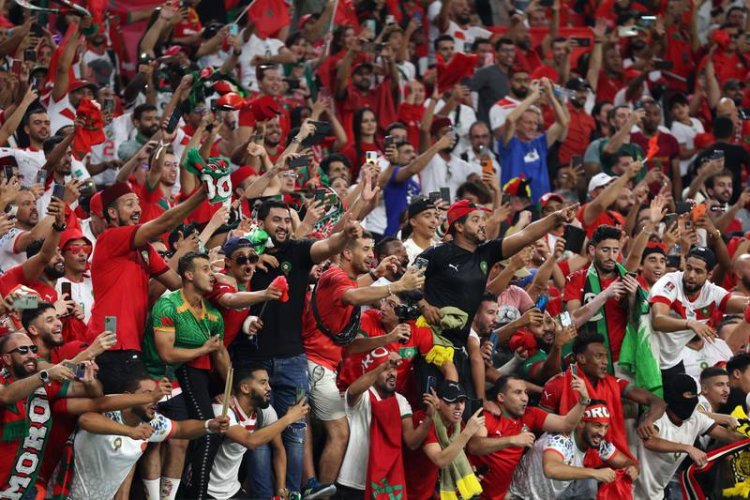Qatar 2022: Paris police on high alert as France play Morocco

The World Cup semi-final between France and Morocco will be more than a football match.
It is also an encounter between a former colonial power and its one-time protectorate that will be played out against an inflammatory backdrop.
With police braced for violence in Paris, populists denouncing mass immigration and diplomats hoping that the outcome does not exacerbate an already strained relationship, the game is serving to highlight post-imperial scars that have never quite healed.
“A game against France always goes beyond a sporting framework [in Morocco],” said Pierre Vermeren, 56, professor of contemporary history at the Sorbonne University in Paris. “It is a great joy, a great pride but also a revenge on history in the event of victory. And this match has not arrived at the best moment in the Franco-Moroccan relationship.”
His comment is something of a euphemism. Catherine Colonna, 66, President Macron’s foreign minister, will fly to Rabat for talks with Nasser Bourita, 53, her Moroccan counterpart, in a bid to appease tensions that have been simmering for months. Colonna reportedly hopes to woo her host — and obtain an invitation for Macron to visit King Mohammed VI of Morocco next year — with an offer to end a curb on visas for Moroccan nationals.
Yet her proposal comes with Moroccan immigration already at the centre of an explosive debate in France after the north African nation’s unexpected performances in Qatar.
The celebrations in Paris and provincial cities that followed each Morocco triumph, many of which have been marred by violence, are a source of deep division among the French electorate.
While some passers-by stopped to applaud cars honking horns and waving Moroccan flags as they drove around Paris after the country’s victory over Portugal in Saturday’s quarter-final, France’s powerful populist movements uttered howls of rage.
They argued that the jubilant scenes showed that even those among the Moroccan immigrant community born in France were more attached to the country of their forebears.
In short, there are no easy answers for Macron. If he eases restrictions on Moroccan immigration, he will face right-wing fury. If he does not, he risks perpetuating a frosty relationship with M6, as Morocco’s monarch is known, with potentially damaging consequences for French security and economic interests.
It was not always like this. For decades, Morocco had relatively smooth relations with France after obtaining independence in 1956 after 44 years as a protectorate.
Unlike neighbouring Algeria, which left the French empire after a war in which hundreds of thousands died, Morocco’s transition was broadly peaceful, helping it to maintain economic and security cooperation with France.
In turn, members of the Parisian elite such as Yves Saint Laurent, the late fashion designer, continued to flock to Marrakesh, where they bought up second homes in the sun
The relationship started to sour a couple of years ago when it emerged that Morocco had used Israeli spyware to tap the telephones of senior French figures, including Macron. Rabat, for its part, was angered by Macron’s refusal to follow Donald Trump’s lead in recognising its sovereignty over the Western Sahara, a disputed territory with a big independence movement.
Tensions escalated further last year when Paris announced curbs on visas for people from its former north African colonies. As a result of the announcement, the number of visas granted to Moroccans fell from about 346,000 in 2019 to 69,408 in 2021.
The measure was designed as punishment for what Paris said was the failure of Morocco, Algeria and Tunisia to co-operate in the fight against illegal immigration.
French officials complained that they hardly ever took back nationals issued with expulsion orders for being in France without authorisation. Only 2.4 per cent of Moroccans given expulsion orders were returned to their country of origin last year.
Macron is now keen to end the quarrel with a country that is not only a key ally in the fight against Islamist terrorism but France’s biggest trading partner in Africa. Yet he has gone about it badly.
In August, he chose an electronic music festival in Le Touquet, the Channel coast resort where Brigitte, his wife, has a holiday home, to announce that he intended to visit Morocco within a couple of months.
Rabat found his approach cavalier and the setting for the announcement unsuitable. It let it be known that he was not welcome for the time being.
He is sending Colonna across the Mediterranean on a mission to smooth things over.
The French foreign minister is likely to put forward a deal that will involve lifting visa restrictions in return for an invitation for Macron to meet M6 in 2023.

Her task would have been arduous under any circumstance. Morocco’s World Cup success has added to the complexity.
A 2015 parliamentary report estimated the Moroccan community in France — first-generation immigrants and their children — at about 1.5 million. It said the figure included 670,000 dual nationals. But in recent days the community has been embroiled in controversy.
After Morocco defeated Portugal, an estimated 20,000 people gathered on the Champs-Élysées, as did tens of thousands more in towns and cities around France. Most were there to celebrate.
Some were not. Projectiles were thrown at police, shop windows were vandalised and motorbikes were set on fire. There were similar scenes in provinces. In Lille, an officer suffered second-degree burns after colleagues said he was targeted by a firework. A total of 178 people were arrested across France.
There are many Moroccan success stories in France, such as Jamel Debbouze, 47, the comic; Leïla Slimani, 41, the author; or Achraf Hakimi, 24, the Paris Saint-Germain right back, who will go head-to-head with Kylian Mbappé, 23, the France forward who is his best friend, in the semi-final.
Jordan Bardella, 27, the leader of the populist National Rally, sought to make political capital out of the disturbances. “Each time there are games with teams from the Maghreb — it’s true of Morocco but it’s also true of Algeria — we have some supporters who think they can misbehave in an intolerable way,” he said.
“We are paying the price of 30 years of failed immigration and notably assimilation policies. You have a generation which has reached adulthood . . . and which behaves in France like nationals of a foreign state permanently expressing a desire for revenge.”
About 2,000 police officers will be deployed on and around the Champs-Élysées tonight in an attempt to prevent a fresh outbreak of violence.

Walid Regragui, 47, the Morocco manager, himself a dual national who was born in France and has spent most of his life there, appealed for calm. “For Moroccans, for Africans who grew up in France, it must be a festive occasion,” he said. “It’s only football, win or lose.”
Macron, who is travelling to Qatar for the semi-final, will be hoping that Regragui’s message is heard.
A peaceful end to the game would take the wind out of his populist opponents’ sails and facilitate his attempt to reset his relationship with M6.




















